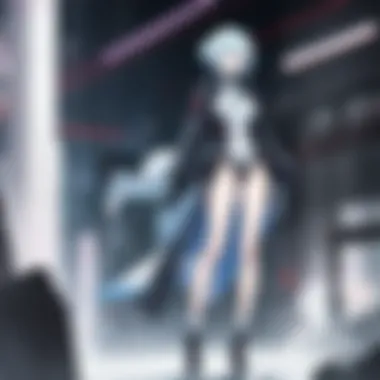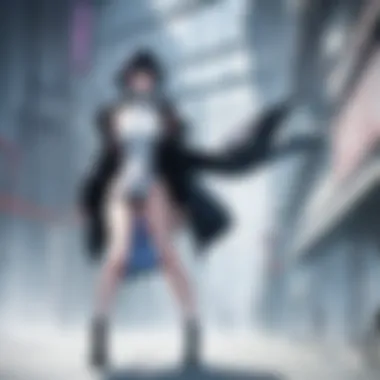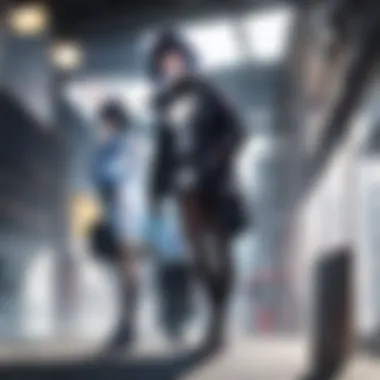Unraveling the Enigmatic Universe of 'The Ghost in the Shell'


Introduction to the Series
Staff and Cast Details
Diving into the creative minds behind 'The Ghost in the Shell,' we uncover the talented individuals who have contributed to the series' success. From directors to animators, each key staff member plays a crucial role in shaping the world of this beloved anime and manga. Additionally, the cast list introduces us to the voice actors and performers whose portrayals bring the characters to life, adding depth and emotion to the narrative.
Theme Music Analysis
The theme music of 'The Ghost in the Shell' is a vital element that sets the tone for the series. By delving into the details of the opening and ending theme songs, we gain an understanding of the musical landscape that complements the futuristic setting of the story. Furthermore, exploring the musicians, composers, and lyricists involved provides insights into the creative process and the thematic resonance of the music with the series.
Plot Summary and Analysis
A comprehensive journey through the intricate plot of 'The Ghost in the Shell' unveils the layers of story arcs and character developments present in this compelling narrative. Analyzing the plot twists, themes, and motifs offers a deeper appreciation of the storytelling techniques employed to engage and mystify the audience. Moreover, critical insights provide a fresh perspective on the narrative structure and its impact on conveying poignant messages.
Reception and Impact
Revealing the reception and impact of 'The Ghost in the Shell' sheds light on the series' place in the realm of anime and manga. From reviews and ratings to discussions on cultural significance, we explore the lasting legacy of this work and its influence on the genre. Drawing comparisons with similar series adds valuable context to appreciate the uniqueness and importance of 'The Ghost in the Shell' in the broader landscape of storytelling.
Introduction to 'The Ghost in the Shell'
The section 'Introduction to 'The Ghost in the Shell' forms the backbone of this article, serving as the gateway to the intricate world of this iconic anime and manga series. It sets the stage for a deep dive into the themes, characters, and technological allure that defines 'The Ghost in the Shell'. Delving into the origins and evolution of the concept, key themes, and its significant impact on pop culture, this section lays the foundation for a comprehensive exploration of the series and its enduring legacy.
Origins and Evolution
The Genesis of the Concept
Delving into the genesis of the concept behind 'The Ghost in the Shell' unravels a tapestry of innovation and foresight. Understanding how the initial idea took shape provides invaluable insights into the evolution of the series and its relevance in contemporary culture. The unique blend of cyberpunk elements and philosophical depth embedded in the genesis of the concept forms a rich backdrop for exploring the intricate layers of the narrative. Its ability to transcend time and societal norms adds a layer of complexity that makes it a compelling choice for examination within this article.


The Transformation Over Time
Tracking the transformation of 'The Ghost in the Shell' over time reveals a metamorphosis reflective of shifting cultural paradigms and technological advancements. Observing how the series adapted and grew in response to changing audience preferences and socio-political landscapes offers a fascinating lens through which to appreciate its enduring appeal. The evolution of characters, themes, and visual aesthetics underscores the series' ability to remain relevant and impactful across generations, making it a relevant focal point for exploration in this article.
Key Themes and Motifs
Identity and Consciousness
Exploring the theme of identity and consciousness within 'The Ghost in the Shell' unveils a nuanced portrayal of selfhood in an increasingly technologically mediated world. The interplay between man and machine, essence and existence, invites contemplation on what defines humanity in a cybernetic age. This thematic core not only underscores the philosophical richness of the series but also serves as a poignant commentary on the nature of being in a digitized society. Its relevance and depth make it a vital aspect to dissect within the context of this article.
Character Exploration
Character exploration plays a pivotal role in unraveling the intricate world of 'The Ghost in the Shell' in this article. By delving into the depths of each character's psyche and motivations, readers gain a profound understanding of the complexities within this iconic series. Through in-depth analysis and careful examination, we illuminate the integral roles that these characters play in shaping the narrative landscape of 'The Ghost in the Shell'. Each character offers a unique perspective, adding layers of depth and intrigue to the overarching storyline.
Major Characters Overview
Motoko Kusanagi
Motoko Kusanagi, the enigmatic protagonist of 'The Ghost in the Shell', embodies the essence of cybernetic evolution and human-machine symbiosis. Her steadfast pursuit of identity and consciousness forms the thematic backbone of the series, challenging traditional notions of self and existence. Kusanagi's unparalleled combat skills, coupled with her introspective nature, make her a compelling focal point for examining the series' exploration of humanity in the digital age.
Batou
Batou, Kusanagi's loyal comrade, represents the stoic and dependable side of Section 9. His unwavering loyalty and exceptional combat prowess complement Kusanagi's philosophical musings, offering a perfect balance of action and contemplation. Batou's cybernetic enhancements and gruff exterior provide a fascinating juxtaposition to his profound sense of duty and morality, making him a standout character in the series.
Togusa
Togusa, the analog holdout in a digital world, brings a refreshing perspective to Section 9 with his reliance on traditional investigative techniques. His emphasis on intuition and human connection contrasts sharply with the cybernetic enhancements of his teammates, adding a humanizing element to the group dynamic. Togusa's unwavering dedication to justice and his compassionate nature make him a crucial anchor in the moral compass of 'The Ghost in the Shell'.
Aramaki


As the wise and composed leader of Section 9, Aramaki exudes authority and strategic brilliance. His calm demeanor belies a razor-sharp intellect and unwavering commitment to upholding justice in a world fraught with political intrigue and technological advancements. Aramaki's guidance and mentorship provide a steady foundation for the team, instilling a sense of unity and purpose that is essential for navigating the complex web of challenges they face.
Villains and Antagonists
The Puppet Master
The enigmatic Puppet Master serves as a convoluted mirror to Kusanagi, challenging her beliefs and convictions at every turn. His enigmatic nature and philosophical musings blur the lines between man and machine, forcing both characters and readers to question the nature of consciousness and autonomy. The Puppet Master's manipulative schemes and cryptic motives add a layer of unpredictability to the narrative, keeping viewers on the edge of their seats as his true agenda gradually unfolds.
The Laughing Man
A symbol of elusive defiance, The Laughing Man embodies the tension between individuality and societal control in a world dominated by technology. His iconic visage and enigmatic presence serve as a rallying point for those disillusioned with corporate corruption and governmental oversight. The Laughing Man's mysterious exploits and cryptic messages challenge the status quo, inspiring both fear and admiration in equal measure as he continues to blur the lines between hero and villain.
Hideo Kuze
Hideo Kuze emerges as a complex antagonist driven by personal vendettas and ideological clashes with our protagonists. His charismatic allure and revolutionary zeal pose a formidable challenge to the established order, forcing Kusanagi and her team to confront uncomfortable truths about their own motivations and allegiances. Kuze's intricate backstory and moral ambiguity make him a compelling adversary, pushing the boundaries of conventional villainy and adding shades of gray to the series' morally charged narrative.
Artistic and Visual Style
Artistic and Visual Style plays a pivotal role in unraveling the essence of 'The Ghost in the Shell.' It serves as a visual anchor, captivating viewers and immersing them in a dystopian future where humanity and technology intertwine seamlessly. The meticulous attention to detail in the animation brings a sense of realism to the cybernetic world portrayed in the series, enhancing the overall storytelling experience. Through the creative fusion of art and technology, 'The Ghost in the Shell' achieves a distinct aesthetic that sets it apart in the realm of anime and manga.
Cyberpunk Aesthetics
Futuristic Cityscapes
The representation of Futuristic Cityscapes in 'The Ghost in the Shell' establishes a hauntingly beautiful backdrop that sets the tone for the narrative. These cityscapes are not merely settings but active participants in shaping the characters' experiences, reflecting the themes of alienation and urban decay. The stark contrast between towering skyscrapers and dark alleyways creates a sense of depth and complexity, illustrating the dichotomy between progress and societal neglect. Futuristic Cityscapes serve as a visual metaphor for the fragile balance between humanity and the encroaching influence of technology.
Human-Machine Interface Designs
The Human-Machine Interface Designs in 'The Ghost in the Shell' embody the core theme of merging man and machine. These intricate designs visualize the seamless integration of technology into the characters' bodies, blurring the line between human consciousness and artificial intelligence. The careful attention to detail in these interfaces showcases the advanced cybernetic capabilities within the series, emphasizing the characters' enhanced capabilities and internal struggles. While these designs symbolize technological advancement, they also evoke a profound sense of unease, questioning the ethical implications of a world where humans can so effortlessly become machines.


Animation Techniques
Use of CGI
The Use of CGI in 'The Ghost in the Shell' elevates the visual experience to a new level of sophistication. CGI enables the creators to craft intricate action sequences and mesmerizing environments that would be challenging to achieve through traditional animation. The seamless integration of CGI enhances the realism of the cybernetic world, immersing the audience in a futuristic realm filled with technological wonders and existential dilemmas. While CGI brings a sense of grandeur to the series, it also sparks discussions about the evolving nature of animation and its impact on storytelling in the digital age.
Symbolism and Imagery
Symbolism and Imagery in 'The Ghost in the Shell' add layers of depth to the narrative, inviting viewers to peer beneath the surface of the story. Through symbolic motifs and visual metaphors, the series explores complex themes of identity, consciousness, and the nature of reality. The meticulous attention to imagery enhances the storytelling, allowing for subtle nuances and hidden meanings to emerge throughout the series. By weaving symbolism into the very fabric of its animation, 'The Ghost in the Shell' invites audiences to ponder the philosophical underpinnings of its futuristic world and the implications of humanity's symbiotic relationship with technology.
Narrative Complexity and Depth
Delving into the core essence of 'The Ghost in the Shell,' it becomes evident that its narrative complexity and depth serve as the cornerstone of its appeal and intrigue. The intricate layers woven into the storyline transcend mere entertainment, offering a profound exploration of existential dilemmas, societal constructs, and human-machine dynamics. The meticulous attention to detail in character development and thematic richness propels the series beyond conventional anime narratives, setting it apart as a cerebral masterpiece in the realm of cyberpunk fiction.
Philosophical Underpinnings
Existentialism and Technology
Existentialism and Technology form a symbiotic relationship within 'The Ghost in the Shell,' underscoring profound philosophical undercurrents throughout the narrative. The juxtaposition of human consciousness with artificial intelligence delves into the essence of existence and the blurred boundaries between man and machine. Existential crises permeate the characters' journeys, compelling introspection on the nature of self, purpose, and autonomy, mirroring real-world ethical quandaries in technological advancements. This thematic choice enriches the storytelling, infusing it with philosophical gravitas and provoking contemplation on the consequences of melding humanity with cutting-edge technology.
Transhumanism and Cybernetics
The exploration of Transhumanism and Cybernetics within 'The Ghost in the Shell' amplifies the series' futuristic undertones, envisioning a world where human augmentation blurs the lines of natural evolution. Embracing the potential of cybernetic enhancements, the narrative confronts notions of identity, mortality, and societal integration in a technologically driven society. The allure of transcending human limitations through cybernetic enhancements juxtaposes moral dilemmas with technological advancements, offering a compelling discourse on the ethics of transhumanism. This thematic choice imbues the narrative with speculative depth, challenging perceptions of humanity's future trajectory amidst rapid technological evolution.
Legacy and Cultural Significance
Influence on Cyberpunk Genre
Cross-Media Adaptations
The Cross-Media Adaptations of 'The Ghost in the Shell' hold a pivotal role in expanding the series' reach and impact. These adaptions transcend the boundaries of traditional mediums, venturing into realms such as films, video games, and spin-off series. By delving into diverse platforms, 'The Ghost in the Shell' not only garners a broader audience but also enriches its narrative by exploring different storylines and perspectives. The multifaceted nature of Cross-Media Adaptations allows fans to immerse themselves in a sprawling universe, deepening their connection with the series and fostering a vibrant community of enthusiasts.
Cultural References and Homages
The Cultural References and Homages within 'The Ghost in the Shell' serve as a testament to the series' cultural impact and significance. Through subtle nods to philosophical texts, historical events, and iconic artworks, the creators pay homage to the rich tapestry of influences that have shaped 'The Ghost in the Shell.' These references not only add layers of depth to the narrative but also invite viewers to contemplate complex ideas and themes. By intertwining cultural nuances within its storyline, 'The Ghost in the Shell' elevates itself beyond a mere entertainment piece, transcending into a thought-provoking exploration of humanity, consciousness, and technological evolution.















